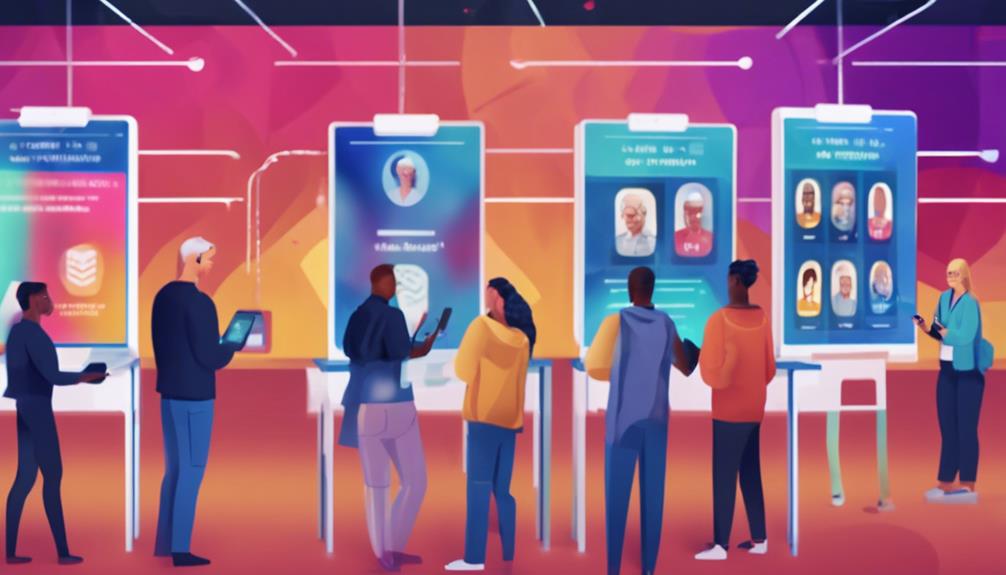La rivoluzionaria verifica dell'identità digitale di Uqudo sta trasformando il modo in cui interagiamo in un panorama digitale. La nostra autenticazione biometrica e la tecnologia avanzata garantiscono controlli identitari sicuri e accurati. Con oltre 288.469 elettori che hanno partecipato alle prime elezioni completamente digitali dell'Oman, abbiamo dimostrato il potere di promuovere la fiducia nei processi democratici. Siamo riconosciuti per la nostra leadership nel settore, ricevendo riconoscimenti come il Miglior Soluzione KYC ai Fintech Awards 2023. Il nostro impegno per la sicurezza dei dati e la privacy degli utenti ci distingue. Allineandoci con obiettivi sostenibili, diamo potere agli individui mentre miglioriamo la comodità. Se esploriamo ulteriormente, scopriremo di più sulle soluzioni impattanti di Uqudo e sulle aspirazioni future.
Punti Chiave
- Uqudo impiega un'autenticazione biometrica avanzata, migliorando la verifica dell'identità sicura per individui e organizzazioni in vari settori.
- L'azienda utilizza tecnologie AI e blockchain per migliorare l'accuratezza e prevenire la frode d'identità nelle transazioni digitali.
- Le soluzioni di Uqudo si allineano ai requisiti normativi globali, garantendo conformità e costruendo fiducia tra i clienti nei settori finanziario e delle telecomunicazioni.
- L'impegno dell'azienda per la privacy dei dati riduce i rischi associati alla condivisione dei dati, favorendo la fiducia degli utenti nelle soluzioni di identità digitale.
L'impatto di Uqudo sulle elezioni

Uqudo ha trasformato il panorama elettorale in Oman, consentendo le prime elezioni municipali completamente digitali del paese, permettendo a oltre 288.469 elettori di partecipare in modo semplice e sicuro. Questa innovazione non solo ha migliorato la comodità, ma ha anche notevolmente aumentato l'accuratezza del processo di voto.
Digitalizzando le elezioni, abbiamo ridotto gli errori e garantito che i risultati fossero affidabili, promuovendo la fiducia nel processo democratico. Le nostre soluzioni hanno portato efficienza a un sistema tradizionalmente ingombrante, consentendo ai cittadini di interagire con il proprio governo senza sforzo.
Siamo orgogliosi di aver svolto un ruolo fondamentale in questo momento storico, dimostrando come la tecnologia possa migliorare la partecipazione civica. Mentre riflettiamo su questo traguardo, rimaniamo impegnati in ulteriori innovazioni che continueranno a plasmare il futuro della democrazia in Oman e oltre.
Offerte di prodotti innovativi

Costruendo sul nostro successo nell'aumentare la partecipazione civica, siamo entusiasti di presentare le nostre offerte di prodotti innovativi che rivoluzionano la verifica dell'identità digitale in vari settori.
Le nostre soluzioni sono progettate per integrarsi senza soluzione di continuità nei sistemi esistenti, fornendo alle organizzazioni gli strumenti di cui hanno bisogno per promuovere fiducia e sicurezza.
- Autenticazione Biometrica: Tecnologia avanzata che garantisce una verifica dell'identità sicura.
- Verifica Globale del Passaporto: Semplificare i controlli dell'identità per i clienti internazionali.
- Soluzioni KYC e AML: Snellire la conformità per le istituzioni finanziarie.
Con il nostro impegno a sfruttare l'IA, la blockchain e la rilevazione 3D della vitalità, stiamo ridefinendo il modo in cui l'identità viene verificata, rendendo i processi più fluidi e affidabili per tutti gli attori coinvolti.
Vantaggi competitivi e premi
La nostra ampia copertura nella regione MEA ci offre capacità uniche di verifica dell'identità che ci distinguono nel mercato.
Abbiamo sviluppato un modello di prezzo conveniente che garantisce ai clienti di pagare solo per l'onboarding riuscito, aumentando il nostro appeal.
Il nostro impegno per l'innovazione ci ha valso il titolo di Migliore Soluzione KYC agli Leaders in Fintech Awards 2023, dimostrando la nostra leadership nella verifica dell'identità digitale.
Inoltre, numerosi premi evidenziano la nostra crescita rapida e riconoscimento all'interno del settore.
Questi riconoscimenti riflettono non solo i nostri progressi tecnologici ma anche la nostra dedizione a promuovere fiducia e trasparenza in vari settori, tra cui banche, telecomunicazioni e fintech.
Insieme, stiamo ridefinendo il panorama dell'identità digitale e posizionandoci come leader nel settore.
Sicurezza e Privacy dei Dati

Riconoscendo le crescenti preoccupazioni riguardo alla privacy e alla sicurezza dei dati, poniamo la massima priorità a misure robuste per proteggere le informazioni personali, migliorando al contempo la fiducia degli utenti nella verifica dell'identità digitale.
Il nostro impegno per la sicurezza e la privacy è evidente attraverso i nostri approcci innovativi:
- Utilizziamo metodi di crittografia avanzati per proteggere i dati personali.
- La nostra tecnologia proprietaria previene attivamente frodi e furti d'identità.
- Garantiamo la conformità ai requisiti normativi, dando agli utenti il controllo sui propri dati.
Allineamento con gli Obiettivi Sostenibili

Uqudo allinea le sue pratiche con l'Obiettivo di Sviluppo Sostenibile 16.9 delle Nazioni Unite, garantendo l'identità legale per tutti, il che migliora l'accesso ai servizi essenziali e promuove l'inclusione sociale. Dando priorità alla verifica dell'identità inclusiva, contribuiamo a costruire una società più giusta. La nostra dedizione alla sicurezza e alla privacy dei dati rafforza ulteriormente questo impegno.
| Vantaggio | Contributo di Uqudo | Impatto Sostenibile |
|---|---|---|
| Identità Legale | Fornisce soluzioni di ID digitale per tutti | Promuove l'inclusione sociale |
| Accesso ai Servizi | Migliora l'accesso a servizi bancari e sanitari | Riduce le disuguaglianze |
| Privacy dei Dati | Utilizza tecnologie di crittografia avanzata | Costruisce fiducia nell'identità digitale |
| Empowerment | Consente agli individui di controllare i propri dati | Favorisce lo sviluppo della comunità |
Insieme, ci impegniamo per un paesaggio digitale più equo.
Tendenze e approfondimenti di mercato

Con l'aumento delle transazioni digitali, la domanda di sistemi robusti di verifica dell'identità diventa sempre più critica.
Stiamo assistendo a diverse tendenze di mercato chiave che evidenziano questa necessità:
- Il passaggio verso servizi remoti sta creando un aumento delle soluzioni di identità digitale.
- I consumatori stanno diventando più consapevoli della privacy dei dati, spingendo la domanda per metodi di verifica sicuri.
- Le pressioni normative stanno aumentando, esortando le organizzazioni ad adottare soluzioni di identità conformi.
Queste tendenze non solo amplificano l'importanza della verifica dell'identità, ma si allineano perfettamente con la missione di Uqudo di migliorare la fiducia e la sicurezza nel panorama digitale.
Strategie di Crescita Futura

Costruendo sulla crescente domanda di verifica dell'identità sicura, le nostre strategie di crescita future si concentrano sull'espansione dei nostri servizi nella regione EMEA per soddisfare meglio le esigenze dei clienti.
Puntiamo a migliorare le nostre offerte di KYC, KYB, screening e autenticazione, assicurandoci di rimanere un passo avanti rispetto alle tendenze di mercato.
Sfruttando soluzioni biometriche avanzate ed esplorando sistemi di identità decentralizzati, siamo impegnati a migliorare l'esperienza utente e la sicurezza.
Inoltre, creeremo partnership con aziende sia emergenti che consolidate, creando un ecosistema robusto per la verifica dell'identità digitale.
Continueremo anche a enfatizzare la privacy dei dati e la conformità normativa, rafforzando la fiducia tra i nostri clienti e gli utenti.
Insieme, siamo pronti a rivoluzionare la verifica dell'identità digitale e a guidare il settore verso un futuro più sicuro. Siamo determinati a combattere la frode e proteggere la privacy online. Con le nostre soluzioni innovative, riusciremo a garantire un’identificazione affidabile e a prevenire le truffe digitali. Inoltre, siamo impegnati a lavorare a stretto contatto con le autorità e le aziende per creare standard più elevati di sicurezza digitale.
Domande frequenti
Quali tipi di industrie traggono maggior beneficio dalle soluzioni di Uqudo?
Crediamo che vari settori traggano grandi benefici dalle soluzioni di identità digitale, in particolare il settore bancario, delle telecomunicazioni e fintech. Questi settori prosperano grazie a una maggiore sicurezza, fiducia ed efficienza, che migliorano in ultima analisi l'esperienza degli utenti e semplificano le operazioni per tutti i soggetti coinvolti.
Come garantisce Uqudo la conformità alle normative locali?
Oltre il 70% dei nostri clienti riporta un miglioramento della conformità. Garantiamo l'adesione alle normative locali integrando rigorosi protocolli KYC e AML, sfruttando tecnologie avanzate e coinvolgendo attivamente gli organismi di regolamentazione per rimanere informati e allineati.
Qual è il processo per integrare la tecnologia di Uqudo?
Per integrare la tecnologia di Uqudo, iniziamo utilizzando il loro SDK senza soluzione di continuità, che ci consente di incorporare facilmente la verifica dell'identità digitale. Poi, personalizziamo la soluzione per adattarla alle nostre esigenze specifiche e garantire un'implementazione fluida.
I servizi di Uqudo possono essere personalizzati per esigenze aziendali specifiche?
Sì, i servizi di Uqudo possono essere personalizzati per soddisfare esigenze aziendali specifiche. Collaboriamo a stretto contatto con i clienti, adattando le nostre soluzioni per garantire che soddisfino requisiti unici mantenendo al contempo l'efficienza e migliorando l'esperienza complessiva dell'utente.
Quale supporto offre Uqudo ai clienti dopo l'implementazione?
Quando implementiamo le nostre soluzioni, forniamo supporto continuo attraverso formazione, aggiornamenti regolari e un servizio clienti reattivo. Siamo impegnati a garantire che i nostri clienti si sentano sicuri e pronti a sfruttare la nostra tecnologia in modo efficace.
Conclusione
Mentre cavalchiamo l'onda della trasformazione digitale, siamo entusiasti del futuro della verifica dell'identità.
Il nostro viaggio è appena iniziato e siamo impegnati a migliorare la partecipazione sicura nell'economia digitale per tutti.
Con le nostre soluzioni innovative, non ci limitiamo a tenere il passo con i tempi; stiamo stabilendo il ritmo.
Insieme, costruiamo un mondo in cui fiducia, trasparenza e tecnologia vanno di pari passo, assicurando che ogni individuo possa navigare in questa era digitale con fiducia.









